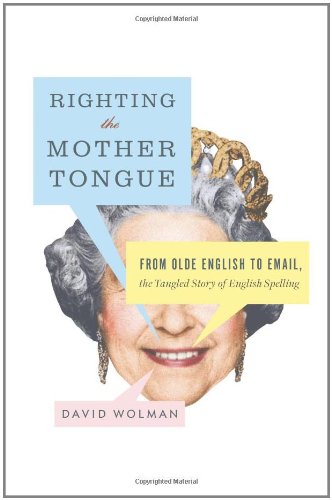

Language is a topic that’s right up my alley; I like hearing about how it’s formed and how it is used. I wish I were better at learning foreign languages, in fact, since it’s something I find fascinating… just something I also happen to suck at. Oh well — at least I’m not too shabby at English. Kinda.
I picked this book up on a whim, actually — it looked like it’d be interesting, so I went for it; never heard of it before, nor read any reviews or anything. But it turns out that I am the exact type of geek who would go “Oh cool, a book not only about spelling, but the history of spelling!” Luckily, it’s a good book on the history of spelling, too.
David Wolman‘s book has a laid-back tone; somewhat similar to pop-historians Sarah Vowell or Paul Collins, although not nearly as meaty as their works; they typically go pretty deep into analysis as well as tangents; Wolman doesn’t really do either. The narrative is rather straight-forward with very few detours that might have enriched the book and made it a little bit more memorable or resonant the way Vowell or Collins can be. However, as criticisms go, that’s hardly a deal-breaker; Wolman’s prose is interesting and brings the story along; colloquial enough to keep it from being dry, but not so much that you question the import of what he says, even if the style itself is somewhat anonymous. That said, an anonymous style is better than an immediately recognizable one that hinders the writing.
The subject matter, though, is the real interesting part. The bulk follows the various attempts at spelling reform throughout history, from the early examples of written English up through today. Some were successful (if accidental — the biggest success comes from publishing and the desire to make everything consistent), while most were interesting and amusing footnotes, often to more-known names (like Melvil Dewey, creator of the Dewey Decimal System, Noah Webster, the creator of the first American English dictionary, President Teddy Roosevelt, or Andrew Carnegie; though in Dewey’s place, he’d probably consider the Dewey Decimal System a footnote to his career as a crusader for Simplified Spelling).
Wolman does take a bit of time out to take a look at how dyslexia, a spelling-related learning disability, works, and debunks a few myths — the biggest being that dyslexics see actual letterforms mirrored; I remember reading a book in elementary school about a dyslexic, where all the chapter headings were printed both normally and mirrored. I always wondered why if that was the case, they just didn’t publish dyslexic textbooks with mirrored text as a stepping stone. Now I know why — at best, the mirror image idea was a metaphor that ended up replacing the literal truth in many people’s minds. There’re a few types of dyslexia too, including one the author is tested for, compensated dyslexia — a form where the brain learns to compensate for the disability, even if it’s not always successful.
Righting The Mother Tongue is a pretty short, quick read; the spelling reformers end up coming off not so much as kooks, but sympathetic people with decent ideas even if they’re not quite sure on how to best implement them (one recurring theme seemed to be people agreeing that spelling should be simplified, but arguments on HOW it should be; from reducing the alphabet, adding to it, making letter sounds consistent, or even throwing out the existing alphabet all together and starting from scratch, in the case of Deseret, the Mormon-backed plan for spelling). The odd thing, however, is that while English spelling is a mess, it didn’t seem to cross people’s minds that, perhaps, the biggest hurdle to learning English is not spelling, but rather its grammar, which is full of weird rules and crazy exceptions. But, I guess, one thing at a time… first the spelling, then the grammar, then the world.










